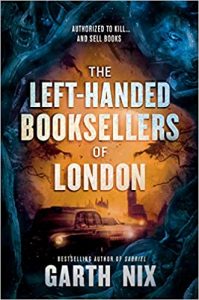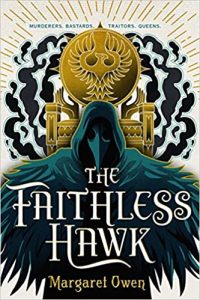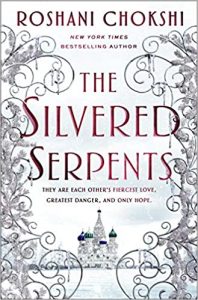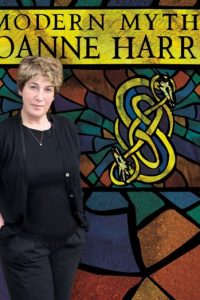Year End Review by Colleen Mondor

While reading for Locus this year, I kept an unofficial list of notes about things I wanted to mention in my end-of-the-year essay. The biggest word on the list is “WITCHES,” which cropped up in more than one memorable title to cross my desk. From the field hockey team that takes a solemn oath within an Emilio Estevez notebook in Quan Barry’s We Ride Upon Sticks to the mill workers who cast a life-saving spell for union solidarity in C.S. Malerich’s Factory Witches of Lowell, witches factored largely in 2020 fantasy fiction. The wide variety of class, ethnicity, and circumstance that showed up in all of these titles was dazzling, and I enjoyed each and every one immensely.
There was the determined friendship of Sasha Laurens’s protagonists in A Wicked Magic, the soul-killing gender barriers that motivated the characters of C.L. Polk’s reimagined Regency England in The Midnight Bargain (oh, how I loved this book!), the rural Florida fiddle-playing determination to get to haunted family truth in Erica Waters’s Ghostwood Song, and Sarah Gailey’s examination of what happens when everything goes wrong in When We Were Magic. I don’t want to read too much into this – many of these books were likely years in the making – but I can’t ignore that so many young people rising up to cast spells and take charge of their lives was a lovely thing to read about in 2020. Even when you move beyond the obvious magic-filled titles, the demands to be recognized, heard, and respected just kept coming last year in YA science fiction and fantasy.
Both Kalynn Bayron and Elana K. Arnold took on reimagined fairy tales in significant ways with Cinderella Is Dead and Red Hood. Arnold’s Red Hood is a dark and devastating look at young women falling prey to murderous men that took the classic to a blood-thirsty end. I was very impressed by how, in the midst of terror and suspense, Red Hood included a healthy look at sex among consenting older teens and made sure to show the assurance such consent provides. It’s also an outstanding mystery with plenty of reasons to cheer for tenacious and curious girls.
Bayron’s Cinderella Is Dead takes readers generations forward from “happily ever after” to a terrifying world with a foundation so dependent upon a story that young women are offered up at annual balls as prizes to area men, and no one challenges the latest, all-powerful, and exceedingly petulant prince. The way the protagonist ferrets out the truth and fearlessly challenges the status quo is just what 2020 is all about. Cinderella Is Dead is also noteworthy for its subplot involving missing young people, most of whom are dismissed or ignored by the populace due to their class and desperation, a situation that calls to mind the real-life horrors of the Highway of Tears.
The magic of Camelot appears with great aplomb in the college-based mystery/adventure/romance Legendborn. There are so many things to love in this novel, from the rich setting to the gauntlet author Tracy Deonn tosses down against the Arthur-ian world, that it is impossible to list them all. But again, we have a resolute main character, in this case 16-year-old Bree Matthews, who must unravel a family secret while fighting some hell-beasts and standing up to centuries worth of class and race-based privilege from her so-called allies before EVERYBODY DIES. (No pressure, right?)
 Violet Choudhury would understand exactly what Bree is going through, because she has her own tradition drama to deal with in Brown Girl Ghosted by Mintie Das. On top of the sudden death and ensuing drama of her high school’s reigning popular girl (following a sex tape release), Violet must deal with her role as a descendent of spiritual fighters who will not leave her alone. She sees dead people, must wield weapons, her ancestors might be trying to kill her, and it is all a lot to deal with. Like Bree, though, Violet perseveres, something that Susan Arkshaw in Garth Nix’s The Left-Handed Booksellers of London and Princess Amora Montara in Adalyn Grace’s All the Stars and Teeth would certainly agree is not always easy to do.
Violet Choudhury would understand exactly what Bree is going through, because she has her own tradition drama to deal with in Brown Girl Ghosted by Mintie Das. On top of the sudden death and ensuing drama of her high school’s reigning popular girl (following a sex tape release), Violet must deal with her role as a descendent of spiritual fighters who will not leave her alone. She sees dead people, must wield weapons, her ancestors might be trying to kill her, and it is all a lot to deal with. Like Bree, though, Violet perseveres, something that Susan Arkshaw in Garth Nix’s The Left-Handed Booksellers of London and Princess Amora Montara in Adalyn Grace’s All the Stars and Teeth would certainly agree is not always easy to do.
Early on in Nix’s novel, Susan Arkshaw discovers she is the product of a deep secret (though not one anyone would ever suspect), and further, finds out that all of London exists alongside a world populated with all manner of goblins, beasties, and god-like creatures. When I reviewed this book, one of my favorite reads last year, I compared it favorably to Charles de Lint and certainly feel that his fans (of whom I am one) will find a lot to love in what Nix has created. There are bookstores, magical bad guys/creatures at every turn, some fabulously fun allies, a car chase, and a wolf encounter that is all grounded in the story of one girl’s search for her father. Nix nails the magic and the mystery with The Left-Handed Booksellers of London and cements his already sterling literary reputation.
Debut author Adalyn Grace’s Amora Montara inhabits a magical island-based world in All the Stars and Teeth and is supposed to prove herself as the “master of souls” and heir to her father’s position. Everything goes awry in the opening pages, and it leaves our frustrated heroine on the run with a pirate who sets out to reveal to her a whole lot of truth that her family has been hiding. The blend of magic, high seas action, and social upheaval makes for great reading with plenty of surprises (some romantic, some all about being a teen girl on the run). There are also very crafty mermaids in Grace’s novel, creatures who I firmly believe remain hopelessly overlooked in YA fiction, which leads me to one of my most outstanding reads of the year, A Song Below Water by Bethany C. Morrow.
 Even after writing a thorough review of Morrow’s book for Locus, I still don’t know where to begin to convey its significance. The two protagonists, friends and foster sisters, live in a Portland OR that is easily recognizable but populated by occasional magical creatures like Tavia, who must hide her siren powers. The worldbuilding in this urban fantasy is fascinating, but it is the politics of the fantasy elements that are most compelling. Tavia and Effie, who has actual demons of her own to contend with, must pull together and stand up to a society that would rather blame its weaknesses on strong Black women, causing them to be literally silenced, and even killed, rather then protect and preserve them. Their burgeoning determination carries them from confrontations in the classroom, to challenges at an annual Renaissance Fair, an all-too-familiar encounter for Black teens with the police, and a street protest. They move separately and then together into appalling confrontations that they have no power to avoid and refuse to ignore. I loved how Morrow shined a light on the damages inflicted by slights and insults that permeate both our society and the one she created, and widened her tale to include bracing moments of shock and awe. A Song Below Water is a burnished jewel of a book; a visit to a starkly magical America that is right outside our doors.
Even after writing a thorough review of Morrow’s book for Locus, I still don’t know where to begin to convey its significance. The two protagonists, friends and foster sisters, live in a Portland OR that is easily recognizable but populated by occasional magical creatures like Tavia, who must hide her siren powers. The worldbuilding in this urban fantasy is fascinating, but it is the politics of the fantasy elements that are most compelling. Tavia and Effie, who has actual demons of her own to contend with, must pull together and stand up to a society that would rather blame its weaknesses on strong Black women, causing them to be literally silenced, and even killed, rather then protect and preserve them. Their burgeoning determination carries them from confrontations in the classroom, to challenges at an annual Renaissance Fair, an all-too-familiar encounter for Black teens with the police, and a street protest. They move separately and then together into appalling confrontations that they have no power to avoid and refuse to ignore. I loved how Morrow shined a light on the damages inflicted by slights and insults that permeate both our society and the one she created, and widened her tale to include bracing moments of shock and awe. A Song Below Water is a burnished jewel of a book; a visit to a starkly magical America that is right outside our doors.
Among other memorable titles, Phil Stamper celebrated the space program while effectively skewering all that is awful about reality television in a sweet and sincere futuristic romance/coming-of-age drama, The Gravity of Us. Lilliam Rivera breathed new life via the music of Prince into the myth of Orpheus and Eurydice in her novel Never Look Back, which is set in the Bronx and addresses the ongoing trauma of Hurricane Maria. Shannon Hale also nodded to the Greek gods in the wryly funny Kind of a Big Deal, which considers what happens when you don’t live up to your own high school expectations.
Sara Faring continues to be one of the more surprising authors in teen fiction, and brought robots, literary mystery, Instagram fame, sad childhoods, artificial intelligence, and fairy tale elements into White Fox. (I cannot describe this book effectively in a few words; you just need to dive in and enjoy the ride.) Patrick Ness has farming, dragons, and a HUGE plot twist in Burn, while Alechia Dow considered the impact of an alien invasion on America in a whole new way with The Sound of Stars.
Meanwhile, Kyrie McCauley’s evocative If These Wings Could Fly considered the longterm impact of trauma on landscape, home, and community in a quiet novel that deserves a lot of attention and still has me thinking months later. And then there was author TJ Klune who had two novels out last year, The Extraordinaries, which looked at superheroes, fandom, and family (especially the families we create with our friends) and The House on the Cerulean Sea, which was the gorgeous salute to doing the right thing, loving who you are and bravely standing up for what’s right that we all need so much. Seek out Klune’s work immediately: he is a true treasure and an absolute gift to teen readers, especially GBLTQ readers, who deserves a massive readership.
 There were also some series entries well worth note this year: Margaret Owen capped her Merciful Crow duology with The Faithless Hawk, Daniel José Older finished his Shadowshaper Cypher trilogy with Shadowshaper Legacy, and Roshani Chokshi had the latest entry in the Gilded Wolves series, with The Silvered Serpents. What they gave readers was a historical fantasy plague drama, a Brooklyn-based fusion of urban fantasy and political fervor, and an artful blend of world-spanning magical drama with secret agent panache, and all of it provided a ton of drama, thrills, and coming-of-age introspection. It’s easy to dismiss what these three authors do so well, which is consistently provide immersive stories, appealing characters, and all manner of imaginative elements. They get the job done so effectively and with such literary power that I cannot recommend their work enough to all fans of teen fiction.
There were also some series entries well worth note this year: Margaret Owen capped her Merciful Crow duology with The Faithless Hawk, Daniel José Older finished his Shadowshaper Cypher trilogy with Shadowshaper Legacy, and Roshani Chokshi had the latest entry in the Gilded Wolves series, with The Silvered Serpents. What they gave readers was a historical fantasy plague drama, a Brooklyn-based fusion of urban fantasy and political fervor, and an artful blend of world-spanning magical drama with secret agent panache, and all of it provided a ton of drama, thrills, and coming-of-age introspection. It’s easy to dismiss what these three authors do so well, which is consistently provide immersive stories, appealing characters, and all manner of imaginative elements. They get the job done so effectively and with such literary power that I cannot recommend their work enough to all fans of teen fiction.
Finally, for younger teens, I remain very impressed by the Rick Riordan Presents imprint which included particular standouts last year from Rebecca Roanhorse, Race to the Sun; Kwame Mbalia, Tristan Strong Destroys the World; and Carlos Hernandez, Sal and Gabi Fix the Universe. Separately, Kate Milford continued to expand on her Greenglass House universe with The Thief Knot, which brought readers back to the charming island-city of Nagspeake and proved yet again that Milford has so much to offer readers with these characters and their delightful world.
Colleen Mondor, Contributing Editor, is a writer, historian, and reviewer who co-owns an aircraft leasing company with her husband. She is the author of “The Map of My Dead Pilots: The Dangerous Game of Flying in Alaska” and reviews regularly for the ALA’s Booklist. Currently at work on a book about the 1932 Mt. McKinley Cosmic Ray Expedition, she and her family reside in the Pacific Northwest and Alaska. More info can be found on her website: www.colleenmondor.com.
This review and more like it in the February 2021 issue of Locus.
 While you are here, please take a moment to support Locus with a one-time or recurring donation. We rely on reader donations to keep the magazine and site going, and would like to keep the site paywall free, but WE NEED YOUR FINANCIAL SUPPORT to continue quality coverage of the science fiction and fantasy field.
While you are here, please take a moment to support Locus with a one-time or recurring donation. We rely on reader donations to keep the magazine and site going, and would like to keep the site paywall free, but WE NEED YOUR FINANCIAL SUPPORT to continue quality coverage of the science fiction and fantasy field.
©Locus Magazine. Copyrighted material may not be republished without permission of LSFF.







